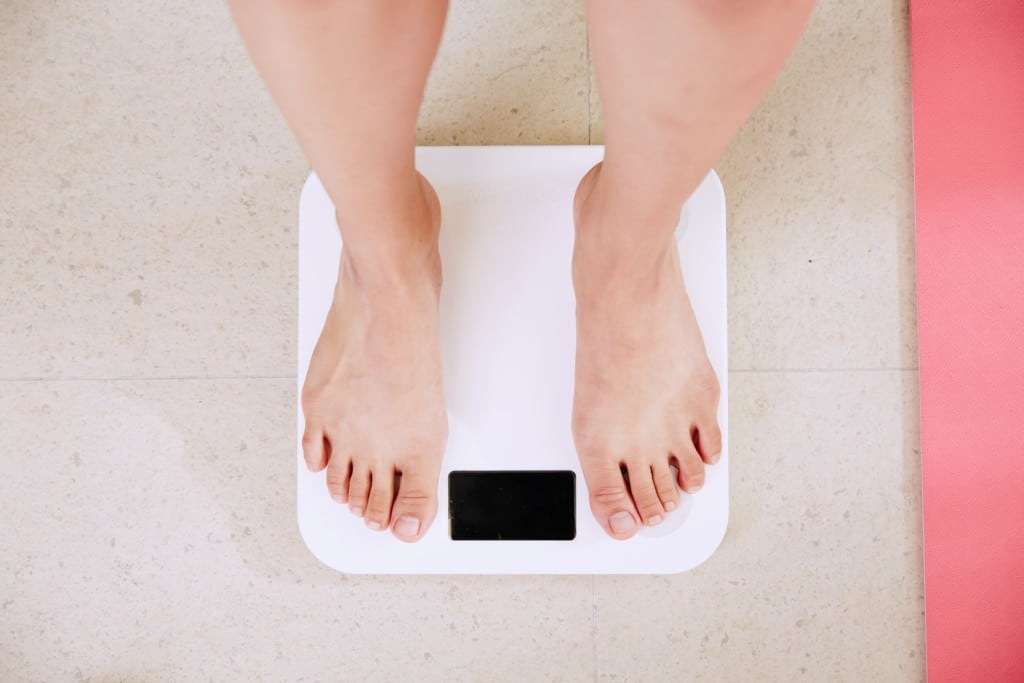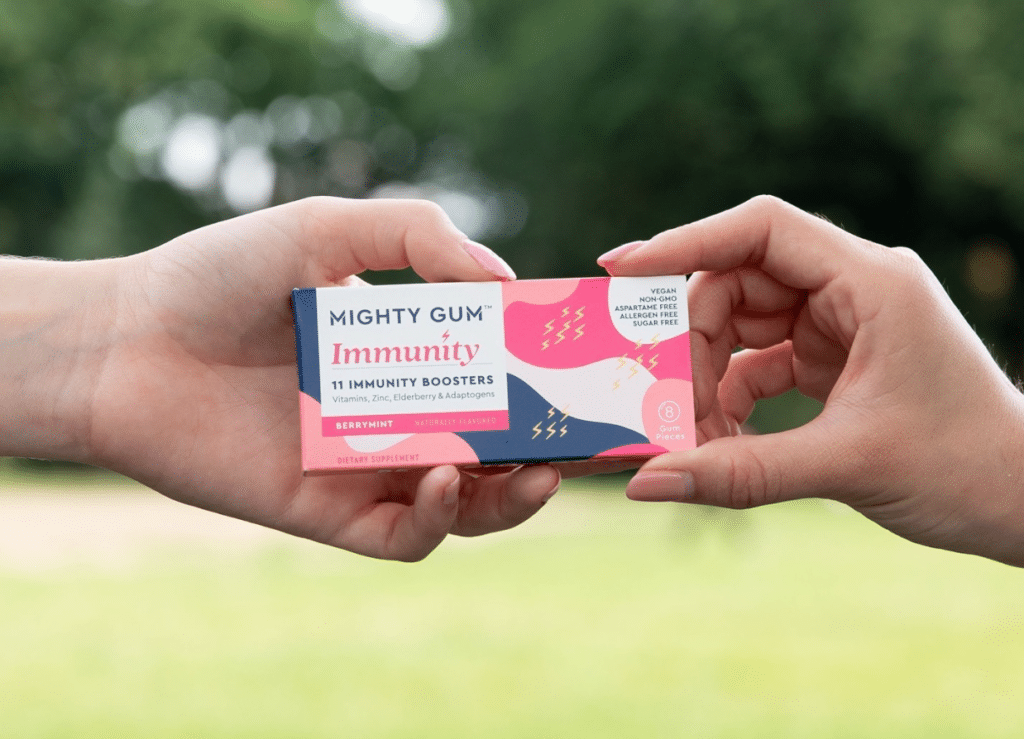
Chewing gum usually gets a bad rap. A lot of common gum brands pack their gum with sugar, artificial sweeteners, synthetic colors, and a few other common additives that make you weak.
It’s too bad, because the act of chewing gum is a surprisingly powerful way to upgrade your body and brain. Chewing gum can help you focus, relieve stress, and even lose weight (and more than you’d think).
If you choose a gum with quality ingredients, you can take advantage of this simple, yet effective biohack. Here’s a look at how chewing gum can make you stronger.
4 Ways Chewing Gum Makes You Stronger
First off: gum that contains sugar or artificial sweeteners is flat-out bad for you, and you’re better off avoiding it.
However, chewing high-quality gum upgrades your biology in a few different ways.
Protect Your Teeth and Eliminate Bad Breath
Gum with sugar will cause cavities and disrupt the bacteria in your mouth.
Sugar-free gum sweetened with xylitol, on the other hand, is a great way to kill bad bacteria and improve your overall oral hygiene.
Xylitol is a natural sweetener that’s good for your mouth (you’ll find it in a lot of toothpastes and alcohol-free mouthwashes).
Studies show that xylitol kills bacteria that cause tooth decay and bad breath, and that it also protects your tooth enamel (1). One recent study found that chewing xylitol-sweetened gum reduced plaque-causing bacteria by 75% (2).
Stress Reduction
Chewing gum is also a simple and effective way to relieve stress. Studies show that the act of chewing lowers cortisol, your main stress hormone, and also decreases mental stress (3). A study on university students found that chewing gum for two weeks significantly reduced anxiety and increased alertness (4).
Cognitive Boost
Chewing gum is good for your brain, too. Research has found that chewing gum improves alertness, decision making, and memory (5, 6).
The improvement isn’t small, either. In one study, people who chewed gum before and during a test did 24% better in the short-term testing portion and 36% better in the long-term portion (7).
It’s important to note that the benefits of chewing gum on memory seem to only last while you’re actually chewing –– so if you want the biggest cognitive boost, try chewing gum while you work throughout the day.
Weight Loss
A recent study found that people who chewed gum throughout the day burned 19% more calories –– that’s an extra 300-400 calories a day for an average person (8).
Chewing gum also causes you to release GLP-1, a peptide that reduces hunger. A 2015 study found that the act of chewing gum significantly suppresses appetite (9).
Not All Gum Is Created Equal
Chewing gum is a more powerful biohack than you might expect –– as long as you choose the right gum.
A lot of gum brands contain crappy ingredients that make you weak. Here are the major ones to avoid.
Aspartame
Aspartame is one of the most popular artificial sweeteners in production. You’ll find it in a lot of sugar-free gum.
It’s also a hotly debated topic. Some researchers believe aspartame is carcinogenic and should be regulated (10). Others claim that it’s safe at current allowable levels in food (11).
With no long-term human studies to vet its safety, you might as well avoid aspartame. There are better alternative sweeteners out there.
BHT (Butylated Hydroxytoluene)
BHT is a preservative that’s banned in many European countries as a “possible carcinogen,” meaning it may increase risk of cancer, although study results are mixed.
In the U.S., BHT is unregulated and is common in a wide variety of processed foods, as well as chewing gum. You’re better off avoiding it.
Titanium Dioxide
Titanium dioxide is another common food additive used to give products a smooth texture and act as a coloring agent. Studies link titanium dioxide to nervous system and organ damage in rats (12), and it’s banned in many European countries.
Hack Your Performance with Functional Chewing Gum
The act of chewing is good for your brain, metabolism, stress levels, and more, and any sugar-free chewing gum with clean ingredients will improve your performance.
But if you want to hack your biology even more, I suggest ordering a few packs of Mighty Gum.
Mighty Gum contains superfoods, adaptogens, and other functional compounds that help you get the most out of your gum. Mighty Gum delivers a variety of essential vitamins and zinc. Ingredients include:
- Xylitol
- Elderberry
- Reishi mushrooms
- Ashwagandha
- Astragalus
- Vitamins and Zinc
Whether you are looking to lose weight, boost your memory, or correct any nutrient deficiencies you may have, popping a piece of functional, nutrient-dense gum into your mouth can help get you there.
Give this biohack a try and see how you feel. You may be surprised by how much chewing gum can boost your performance.
Sources
- Mäkinen, K. K. (n.d.). Sugar alcohol sweeteners as alternatives to sugar with special consideration of xylitol. Retrieved September 14, 2020, from https://pubmed.ncbi.nlm.nih.gov/21576989/
- Bahador, A., Lesan, S., & Kashi, N. (2012, June). Effect of xylitol on cariogenic and beneficial oral streptococci: A randomized, double-blind crossover trial. Retrieved September 15, 2020, from https://www.ncbi.nlm.nih.gov/pmc/articles/PMC3434645/
- H;, K. (n.d.). Mastication as a Stress-Coping Behavior. Retrieved September 15, 2020, from https://pubmed.ncbi.nlm.nih.gov/26090453/
- M;, S. (n.d.). Effects of chewing gum on the stress and work of university students. Retrieved September 15, 2020, from https://pubmed.ncbi.nlm.nih.gov/22402304/
- M;, H. (n.d.). Chewing and attention: A positive effect on sustained attention. Retrieved September 15, 2020, from https://pubmed.ncbi.nlm.nih.gov/26075234/
- KY;, C. (n.d.). Chewing Maintains Hippocampus-Dependent Cognitive Function. Retrieved September 15, 2020, from https://pubmed.ncbi.nlm.nih.gov/26078711/
- Wilkinson, L. (n.d.). Chewing gum selectively improves aspects of memory in healthy volunteers. Retrieved September 15, 2020, from https://pubmed.ncbi.nlm.nih.gov/12071690/
- Levine, J. (n.d.). The energy expended in chewing gum. Retrieved September 15, 2020, from https://pubmed.ncbi.nlm.nih.gov/10627208/
- Xu, J. (n.d.). The effect of gum chewing on blood GLP-1 concentration in fasted, healthy, non-obese men. Retrieved September 15, 2020, from https://pubmed.ncbi.nlm.nih.gov/25758865/
- https://onlinelibrary.wiley.com/doi/full/10.1002/ajim.22296
- https://www.tandfonline.com/doi/abs/10.1080/10408440701516184?journalCode=itxc20&
Hu, R. (n.d.). Neurotoxicological effects and the impairment of spatial recognition memory in mice caused by exposure to TiO2 nanoparticles. Retrieved September 15, 2020, from https://pubmed.ncbi.nlm.nih.gov/20692697/













